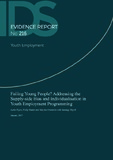| dc.contributor.author | Flynn, J | |
| dc.contributor.author | Mader, P | |
| dc.contributor.author | Oosterom, M | |
| dc.contributor.author | Ripoll, S | |
| dc.date.accessioned | 2016-12-15T14:56:49Z | |
| dc.date.available | 2016-12-15T14:56:49Z | |
| dc.date.issued | 2016-12 | |
| dc.identifier.citation | Flynn, J.; Mader, P.; Oosterom, M. with Ripoll, S. (2016) Failing Young People? Addressing the Supply-side Bias and Individualisation in Youth Employment Programming, IDS Evidence Report 216, Brighton: IDS | en |
| dc.identifier.uri | https://opendocs.ids.ac.uk/opendocs/handle/20.500.12413/12715 | |
| dc.description.abstract | International development actors increasingly focus on youth employment as a key development challenge. The recognition of high rates of unemployment, underemployment and job insecurity among young people around the world has led to a plethora of youth employment interventions, as well as often problematic discourses about youth ‘dividends’ and ‘bulges’, which instrumentalise young people and paint them as security threats. This report problematises and critiques some of the currently predominant models for getting young people into work. Examining the current state of play of donor policies, the report critiques the supply-side bias built into the majority of approaches, and aims to advance an understanding of the demand-side and structural constraints. If supply-side approaches are not matched by measures to address these constraints, it argues, interventions risk adversely incorporating young people into the economy. The report also develops a critique of the overall narrow economic and individualistic approach currently adopted, building on the concept of social navigation to understand how young people’s decisions and trajectories regarding work are shaped in reality. Young people are socially embedded: their agency and aspirations are shaped by social values, positions and expectations, as well as by their social relationships and immediate political contexts. Consequently, the report argues that policies need to be de-individualised, both conceptually and practically, to better reflect the real constraints, opportunities and forces that will shape young people’s engagement with work. | en |
| dc.description.sponsorship | UK Department for International Development | en |
| dc.language.iso | en | en |
| dc.publisher | IDS | en |
| dc.relation.ispartofseries | IDS Evidence Report;216 | |
| dc.rights.uri | http://creativecommons.org/licenses/by/3.0/ | en |
| dc.subject | Children and Youth | en |
| dc.subject | Work and Labour | en |
| dc.title | Failing Young People? Addressing the Supply-side Bias and Individualisation in Youth Employment Programming | en |
| dc.type | IDS Evidence Report | en |
| dc.rights.holder | IDS | en |
| dc.identifier.ag | OT/11009/3/6/727 | |
| rioxxterms.funder | Default funder | en |
| rioxxterms.identifier.project | Default project | en |
| rioxxterms.version | VoR | en |
| rioxxterms.funder.project | c941507f-fd0b-4fc3-9822-4b2132f61a1d | en |


